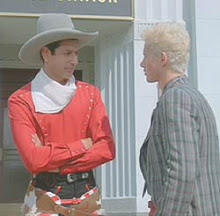
233. LEAH ANDREONE, 'It's Alright, It's OK'
Produced by Rick Neigher; written by Leah Andreone & Rick Neigher
RCA 64662 1997 Billboard: # 57
I've loved this song since the first time I heard it, but there's no way I'd ever call it "authentic."
This is a singer-songwriter thing. The master narrative goes something like this: Bob Dylan changed American music forever by taking folk music and making it personal. After him, coffeehouses sprung up all over Europe and North America, but suddenly singers were no longer required to sing musty old Scottish songs. They could sing about the material of their own lives. And they did it alone, just them and a guitar or a piano on a stage. It was personal and it was non-industrial, just an artist talking to a selective audience.
There are a lot of problems with that reductive narrative, more than I can cover in a single post, but let me begin with just two words: Joni Mitchell. For me, Joni Mitchell was the greatest of the singer-songwriters, maybe not as great a songwriter overall as Dylan, but certainly the greatest at writing confessional songs that were both personal and relatable.
 Again and again, she wrote songs that you can "get" on first hearing, but you can still find new layers in them every time you listen.
Again and again, she wrote songs that you can "get" on first hearing, but you can still find new layers in them every time you listen.But you know what? Mitchell's greatest album, Blue, is impossible without technology. I really felt this with a vengeance a few years back when Ted Turner did one of his tributes to modern songwriters and they featured Mitchell. For nearly all her great songs, those paying tribute couldn't really do justice to them with just one vocalist. All those gorgeous harmonies she laid down? Multitracking. Even when she did everything on an album, it didn't recreate a spontaneous, intimate performance, anymore than Beach Boys' Party! did. Each of Mitchell's albums was a labor of construction, every bit as much as one of her paintings, most of which show a lot more craft than your average Jackson Pollock.
A quarter of a century later, we have Andreone, definitely positioned by her label to be an inheritor of the Mitchell-derived tradition. Writing confessionally? Check. On the first Lilith Fair tour? Check. Huge in France? Check. But, on the other side of the ledger, is she a sellout? She doesn't play all the instruments! She cowrites the song with her producer! She's a fraud!!
I have a simple solution: this isn't folk, or even confession, and it's certainly not truth. It's Pop, and rather accomplished Pop at that. This is a good song about an almost total mental breakdown, but it's too polished to have been written by someone who had ever suffered one. I would bet, though, that she has been around someone who has, because several of the details recorded here seem spot-on. Moreover, no matter what the purists might claim, this song wouldn't have been as good on solo acoustic guitar, because you need the rhythm section and especially the organ to move you through it. And are white confessional folk singers from L.A. allowed to wail like that, as if giving into despair inevitably leads to facing Mecca?
One of the great shames about the reverse snobbism of so much 1990s music culture was that it tried to sell smart Pop as something that it wasn't. This song isn't Truth, but it does have a fair amount of soul. And it's not "upbeat," no matter what the allmusicguide might claim.




